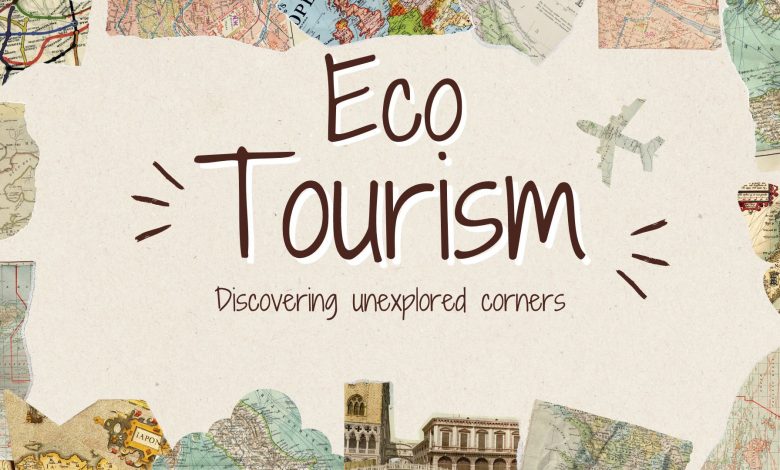The Surging Trend Of Ecotourism

In recent times, there has been a greater consciousness of the role played by the travel industry in environmental degradation and community welfare. In turn, aware travellers who have the conscious characteristic of admitting their footprint is the principal cause of the growing need for Eco-friendly and responsible travel opportunities. Seize ecotourism as a type of travelling that not only provides people with chances to get marvels of the world’s beauty but also supports it and helps keep it in its perfect nature. In this blog post, we’ll travel into the ecosystem of eco-tourism and there we’ll check out the cases of sustainable travel that can cause good for the planet and its inhabitants.
What is Ecotourism?
With ecotourism, which is also known as eco tourism or “green” tourism, the orientation is toward conscious travellers who are keen on exploring natural environments and considering the planet’s health without dying out the local communities. In contrast with the common traditional tourism which could indeed lead to the deterioration of both natural and cultural assets, ecotourism exclusively aims to ensure conservation, education and community empowerment.
Key Principles of Ecotourism:
Environmental Conservation: One of the core principles of ecotourism is to carry out activities in a manner that safeguards and highly respects the natural ecosystems, the habitats of native animals and plant life. The key steps of ecotourism are the reduction of contamination, lowering the carbon footprint, and safeguarding of conservation projects. Therefore, ecotourism helps us to ensure that the coming generations can still appreciate our planet.
Community Engagement: Ecotourism identifies the local people’s affairs and their participation, as well as empowering the local groups to make any decision. Under local shop’s auspices, employment of native guides and preservation of the native cultures and customs, ecotourism is a driver that steers economic development and social unity of the local communities
Education and Awareness: Ecotourism involves educating tourists on the environment, conservation and conservation and sustainable practices issues as well as fostering the relationship between the local people and the environment. Guided tours, interpretive programs and hands-on activities being the ones that provide tourists with the whole picture make them more aware of the conservation of natural resources and world heritage.
Ethical Wildlife Viewing: Ecotourism serves as an instrument of sustainable wildlife-watching culture where animal welfare and preservation are the apex. Activities like whale watching, birdwatching and safari excursions abide by specific items.
Sustainable Travel Experiences:
Eco-Lodges and Sustainable Accommodations: Eco-tourism often involves staying in lodges that not only are economically stable for the community but also are safe for the environment. This means that these places are made out of locally available materials and avoid non-biodegradable items in the most possible ways. Sustainable accommodations are a unique feature of eco-tourism – from cabins built on solar energy amid the forest to remote destinations that are accessible only by off-grid cabins in the wilderness. The guests have the opportunity to enjoy nature while keeping their eco-footprint minimum.
Nature-Based Activities: The spectrum of ecotourism includes nature-based activities that promote lively contact with nature while supporting environmental projects on behalf of ecological economics. You get the chance to explore the tranquillity of the deep woods when you hike and enjoy close-up encounters with marine creatures when snorkelling in colorful reefs. Engaging in these activities will help you develop a passion and love for nature.
Volunteer and Conservation Projects: Since ecotourism is getting popular now the many travel destinations offers voluntarism and conservation activities. It can take place either by putting trees into place in the reforestation, or by monitoring the endangered species all the way to cleaning up beaches and wildlife habitats. This hands-on experience allows the traveller to learn about what they can do as they make a positive impact on the environment.
Cultural Immersion and Community Tourism: Often people get to know the local communities and culture, observe their customs and traditions and learn how they live. This can be done through itineraries of ecotourism, engaging with local communities and thus becoming a supporter and beneficiary of ecotourism. Whether the traditional homestay or cultural festivals including local workshops from craftsmen, this interactivity allows us to expand our understanding and openness toward other peoples’ different cultures.
Responsible Wildlife Encounters: In ecotourism, wildlife interactions are considered to be crucial, and they are not only intended for people’s welfare but also for the living conditions of animals and nature. For instance, people can visit anti-poaching projects, availing themselves of the chance to see the endangered species in their natural landscapes, going to elephant orphanage centres that have ethical standards, or wildlife rehabilitation centres that offer participants worldwide an opportunity to understand the wonders of wildlife together with the chance to give back to conservation efforts.



